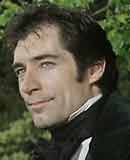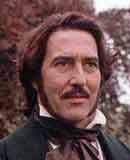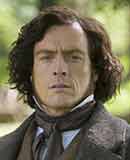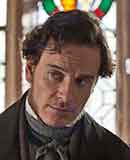Edward Rochester
The principal love interest of Jane. He is Byronic in character, a rich man, popular with others both servants and peers.
Portrayals









Mr Rochester's animals

Pilot
Pilot is Mr Rochester's dog, "a great dog, whose black and white colour made him a distinct object against the trees." He is later identified as a Newfoundland breed. Although large, he is friendly and devoted to Rochester.
Mesrour
Rochester's horse is named Mesrour, a tall, black animal. The name comes from The Arabian Nights where Mesrour was chief of Haroun al Rashid's household, chief of the eunuchs, and chief executioner. Believed to be a Nubian, presumably the man's dark colouring and power appealed to Mr Rochester as a suitable name.
Quotes about Mr Rochester
Chapter 11. "Is Mr Rochester an exacting, fastidious sort of man?"
"Not particularly so; but he has a gentleman's tastes and habits, and he expects to have things managed in conformity to them."
"Do you like him? Is he generally liked?"
"Oh, yes; the family have always been respected here. Almost all the land in this neighbourhood, as far as you can see, has belonged to the Rochesters time out of mind."
"Well, but, leaving his land out of the question, do you like him? Is he liked for himself?"
"I have no cause to do otherwise than like him; and I believe he is considered a just and liberal landlord by his tenants: but he has never lived much amongst them."
"But has he no peculiarities? What, in short, is his character?"
"Oh! his character is unimpeachable, I suppose. He is rather peculiar, perhaps: he has travelled a great deal, and seen a great deal of the world, I should think. I dare say he is clever, but I never had much conversation with him."
"In what way is he peculiar?"
"I don't know – it is not easy to describe – nothing striking, but you feel it when he speaks to you; you cannot be always sure whether he is in jest or earnest, whether he is pleased or the contrary; you don't thoroughly understand him, in short – at least, I don't: but it is of no consequence, he is a very good master."
Chapter 12. His figure was enveloped in a riding cloak, fur collared and steel clasped; its details were not apparent, but I traced the general points of middle height and considerable breadth of chest. He had a dark face, with stern features and a heavy brow; his eyes and gathered eyebrows looked ireful and thwarted just now; he was past youth, but had not reached middle-age; perhaps he might be thirty-five. I felt no fear of him, and but little shyness.
Chapter 13. I knew my traveller with his broad and jetty eyebrows; his square forehead, made squarer by the horizontal sweep of his black hair. I recognised his decisive nose, more remarkable for character than beauty; his full nostrils, denoting, I thought, choler; his grim mouth, chin, and jaw – yes, all three were very grim, and no mistake. His shape, now divested of cloak, I perceived harmonised in squareness with his physiognomy: I suppose it was a good figure in the athletic sense of the term – broad chested and thin flanked, though neither tall nor graceful.
Chapter 13. "You said Mr Rochester was not strikingly peculiar, Mrs Fairfax," I observed, when I rejoined her in her room, after putting Adèle to bed.
"Well, is he?"
"I think so: he is very changeful and abrupt."
"True: no doubt he may appear so to a stranger, but I am so accustomed to his manner, I never think of it; and then, if he has peculiarities of temper, allowance should be made."
Chapter 14. He lifted up the sable waves of hair which lay horizontally over his brow, and showed a solid enough mass of intellectual organs, but an abrupt deficiency where the suave sign of benevolence should have risen.
Chapter 14. With this announcement he rose from his chair, and stood, leaning his arm on the marble mantelpiece: in that attitude his shape was seen plainly as well as his face; his unusual breadth of chest, disproportionate almost to his length of limb. I am sure most people would have thought him an ugly man; yet there was so much unconscious pride in his port; so much ease in his demeanour; such a look of complete indifference to his own external appearance; so haughty a reliance on the power of other qualities, intrinsic or adventitious, to atone for the lack of mere personal attractiveness, that, in looking at him, one inevitably shared the indifference, and, even in a blind, imperfect sense, put faith in the confidence.
Chapter 15. He was proud, sardonic, harsh to inferiority of every description: in my secret soul I knew that his great kindness to me was balanced by unjust severity to many others. He was moody, too; unaccountably so; I more than once, when sent for to read to him, found him sitting in his library alone, with his head bent on his folded arms; and, when he looked up, a morose, almost a malignant, scowl blackened his features. But I believed that his moodiness, his harshness, and his former faults of morality (I say former, for now he seemed corrected of them) had their source in some cruel cross of fate. I believed he was naturally a man of better tendencies, higher principles, and purer tastes than such as circumstances had developed, education instilled, or destiny encouraged. I thought there were excellent materials in him; though for the present they hung together somewhat spoiled and tangled. I cannot deny that I grieved for his grief, whatever that was, and would have given much to assuage it.
Chapter 16. …and Mr Rochester is so talented and so lively in society, that I believe he is a general favourite: the ladies are very fond of him; though you would not think his appearance calculated to recommend him particularly in their eyes: but I suppose his acquirements and abilities, perhaps his wealth and good blood, make amends for any little fault of look."
Chapter 16. "Mr Rochester? I was not aware he could sing."
"Oh! he has a fine bass voice, and an excellent taste for music."
Chapter 17. My master's colourless, olive face, square, massive brow, broad and jetty eyebrows, deep eyes, strong features, firm, grim mouth, – all energy, decision, will, – were not beautiful, according to rule; but they were more than beautiful to me;…
